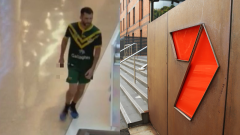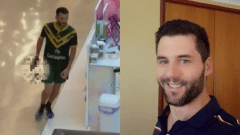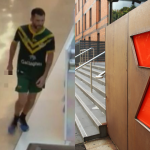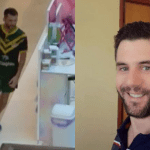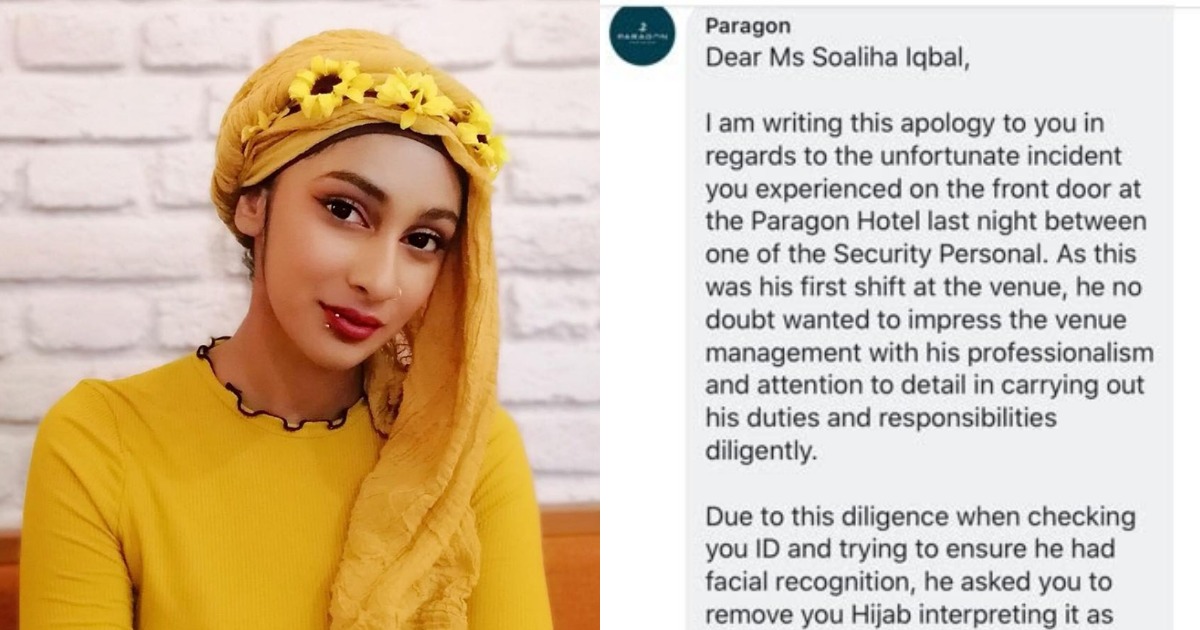
A young Muslim woman said she was left humiliated and frustrated after being asked to remove her hijab by a Sydney bouncer.
Soaliha Iqbal, 21, was lining up with friends to visit the Paragon Hotel in Circular Quay last Friday night when she says the bouncer pointed at her hijab and told her to “take it off”.
[jwplayer WAQmpNlf]
“I was shocked, and didn’t respond or comply,” Iqbal told PEDESTRIAN.TV.
“He repeated himself and also said, ‘What is that? Take it off’. I responded, ‘Are you serious? This is my hijab’.”
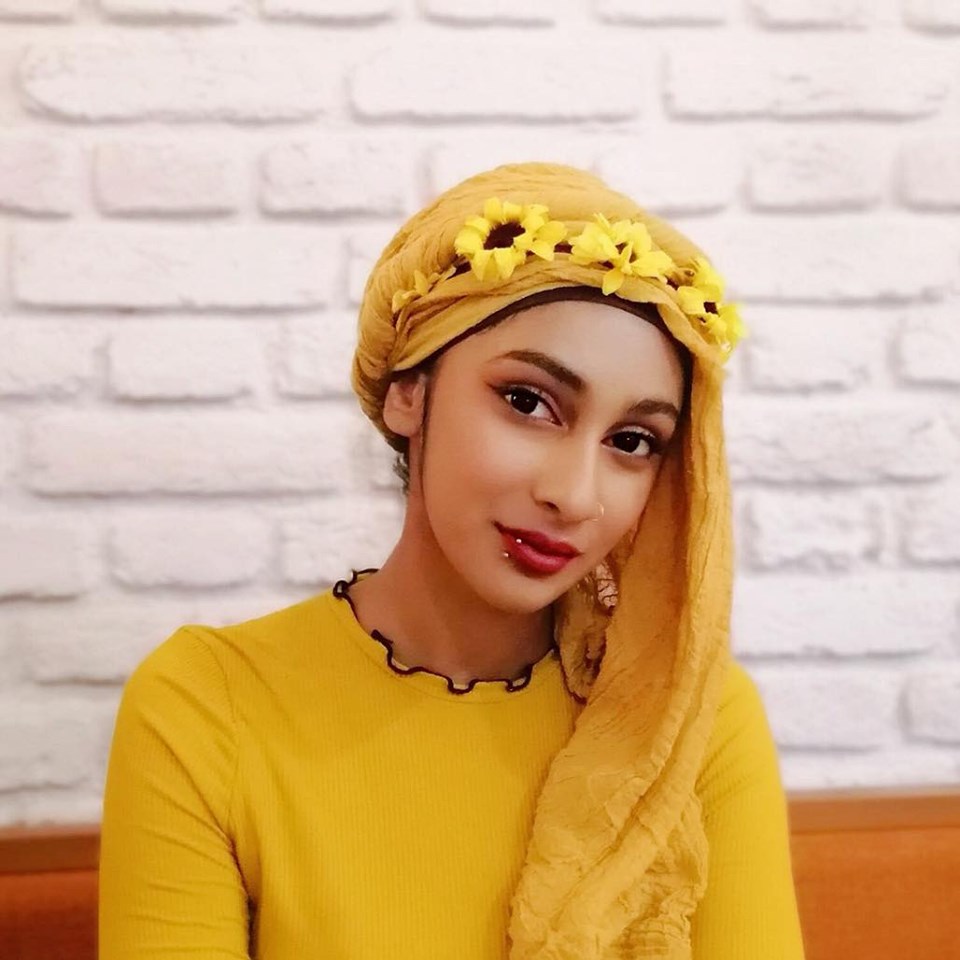
What happened next left Iqbal feeling humiliated, upset, and wondering if she’d been racially discriminated against due to her religion.
According to a Facebook comment from the Paragon account, the bouncer was trying to ID Iqbal and mistook her hijab for a “head scarf”. But Iqbal says the bouncer did not ask to see her ID at any time, and if he had, he would have seen that she wears a hijab in her ID photograph, anyway.
“I’ve never had an establishment ask me to remove my hijab [before],” she told P.TV.
It is unlawful for a venue to refuse entry to a person on the basis of their religion, with NSW Department of Liquor and Gaming guidelines specifically advising that refusing entry to someone wearing a religious head covering could put the venue in breach of the Anti-Discrimination Act 1977.
“I felt threatened and a bit scared,” Iqbal said of the bouncer. “It was very aggressive and he’s a big guy and I am actually a very small girl, so I was definitely threatened.”
Iqbal says that when she was finally able to speak with Paragon management that night, they didn’t offer an apology, instead standing by their bouncer.
“There was a lot of gaslighting. [It was] very humiliating and frustrating and also makes you feel a bit worthless to be told your anger isn’t justified,” she said.
More than a dozen police officers attended the incident, which P.TV understands was likely due to Extinction Rebellion protests having taken place earlier that day.

In a statement, NSW Police said they were satisfied there was no criminal activity during the incident, and provided advice to the group on how to lodge a formal complaint.
“Police remained at the location to prevent any breach of the peace,” the statement said. “The group later dispersed without incident.”
It was only after Iqbal posted about her experience to Facebook that she received an apology, but one in which she says the events are being misconstrued.
A comment from the Paragon Facebook account, which is attributed to Ryan’s Hotel Group operations manager Craig Wesker, “unreservedly” apologises for the bouncer’s mistake.
“As this was [the bouncer’s] first shift on the venue, he no doubt wanted to impress the venue management with his professionalism and attention to detail in carrying out his duties and responsibilities diligently,” a comment from the Paragon Facebook account reads, which is attributed to Ryan’s Hotel Group operations manager Craig Wesker.
“Due to this diligence when checking you (sic) ID and trying to ensure he had facial recognition, he asked you to remove you (sic) hijab interpreting it as only a head scarf.
“Understandably you were taken aback by the request and then by virtue of the fact that there was quite a number of people trying to enter the venue, he asked you to step to one side so he could talk to you further about it. This action appears to have been interpreted you (incorrectly) as the Security Personal denying you entry for you refusing to remove your hijab.”
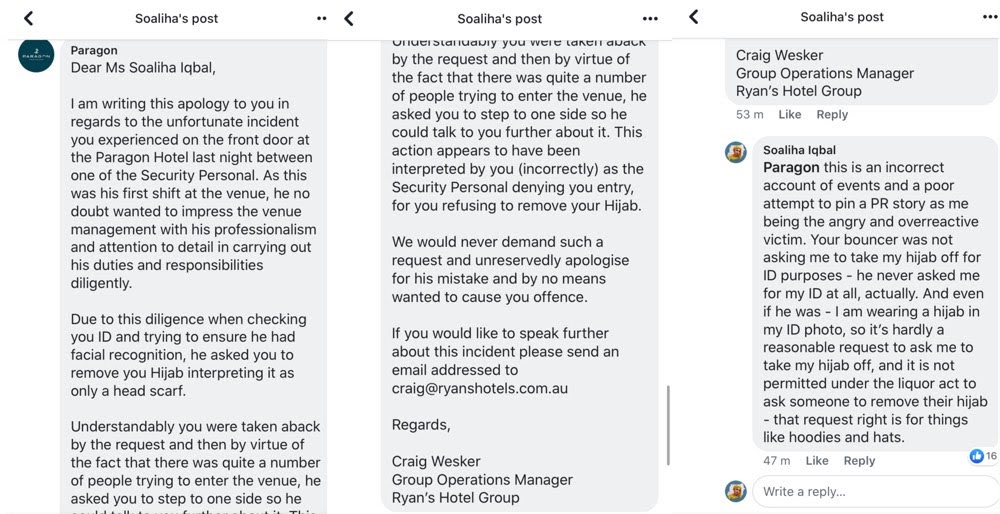
Iqbal said she felt like the apology was trying to shift the blame back onto her.
“It was pretty insulting they were standing by the bouncer’s actions and referring to him as diligent and professional,” she said.
In a post written for blog 5why about her experience, Iqbal said it was the first time she’d had a negative interaction with a bouncer.
“Most bouncers see my hijab and are happy to let me in, because they know that I don’t drink, so I won’t be causing any problems. I usually end up chatting to the Muslim ones, and we have a nice moment of feeling like there’s a community of us out there,” she wrote.
Women wearing Islamic headwear are the most likely people to be the target of Islamophobic incidents, research from the Centre for Islamic Studies and Civilisation, Charles Sturt University and the Islamophobia Register of Australia found in 2017.
Neither Wesker nor Paragon responded to requests for comment from P.TV by the time of publication.

